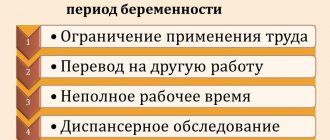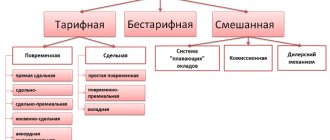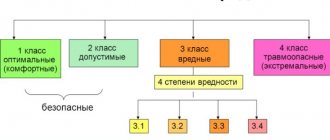The right to work is one of the fundamental human rights, and the importance of working in order to meet one’s needs is undeniable. However, the undeniable significance of this right is not enough to prevent its restrictions.
In modern Russian conditions, cases of discrimination in labor relations occur every day on completely different grounds, and, most importantly, this behavior of employers has become quite familiar to employees. Thus, judicial practice on this issue is not extensive, which is not evidence of the absence of a problem, but rather illustrates workers’ ignorance of their rights and responsibilities and their reluctance to initiate labor disputes.
The problem of ensuring equal access to work and equal pay for it remains one of the most pressing social problems on a domestic and global scale. Labor discrimination is an unacceptable phenomenon that must be opposed.
The concept of discrimination in labor relations
Currently, discrimination is one of the most common violations of human rights, which occurs in almost all spheres of society. In a broad sense, discrimination (from Latin discrimination - difference) is the deprivation or limitation of human rights on any basis/motive. In the legal literature, various types of discrimination are distinguished depending on the area in which it occurs.
In this article we are only interested in discrimination in the field of labor relations. Let's take a closer look at this concept.
The problem of discrimination in labor relations is global in scope and occurs in all countries. In light of this, its regulation by international normative legal acts acquires special significance. Let us recall that Art. 17 of the Constitution of the Russian Federation recognizes and guarantees the rights and freedoms of man and citizen in accordance with generally recognized principles and norms of international law, which also proclaim the human right to work.
Thus, turning to the Universal Declaration of Human Rights, it is necessary to note that the very concept of “discrimination” is not given in it, however, in Art. Article 7 states that: “All persons have the right to equal protection against any discrimination contrary to the Declaration and against any incitement to such discrimination.”
With the advent of the International Labor Organization, a specialized agency dealing with the regulation of labor relations, the concept of “discrimination” was formulated. In Art. 1 of the Convention on Discrimination in Employment and Occupation stipulates that the term “discrimination” includes:
a) any distinction, exclusion or preference based on race, colour, sex, religion, political opinion, national origin or social origin and having the effect of eliminating or impairing equality of opportunity or treatment in employment or occupation;
(b) any other distinction, exclusion or preference having the effect of eliminating or impairing equality of opportunity or treatment in employment or occupation, as may be determined by the member concerned in consultation with representative organizations of employers and workers, where such exist, and with others relevant authorities.
Also, any distinction, exclusion or preference based on the specific requirements of a particular job is not considered discrimination.
In addition, the International Labor Organization proclaimed principles concerning fundamental rights at work, among which was the principle of non-discrimination in employment and occupation. It should be noted that the terms “work” and “occupation” include access to vocational training, access to work and to various occupations, and working conditions.
When examining Russian legislation, first of all it should be noted that the Constitution of the Russian Federation enshrines the legal basis for preventing discrimination, including labor discrimination. According to Part 2 of Art. 19 of the Constitution, the state guarantees equality of rights and freedoms of man and citizen, regardless of gender, race, nationality, language, origin, property and official status, place of residence, attitude to religion, beliefs, membership in public associations, as well as other circumstances. Any form of restriction of the rights of citizens on the basis of social, racial, national, linguistic or religious affiliation is prohibited. Part 3 Art. 19 of the Constitution guarantees that men and women have equal rights and freedoms and equal opportunities for their implementation. At the same time, Part 3 of Art. 37 of the Constitution of the Russian Federation proclaims that everyone has the right to remuneration for work without any discrimination and not lower than the minimum wage established by federal law.
In accordance with Art. 3 of the Labor Code of the Russian Federation, everyone has equal opportunities to exercise their labor rights. At the same time, no one can be limited in labor rights and freedoms or receive any advantages depending on gender, race, skin color, nationality, language, origin, property, family, social and official status, age, place of residence, attitude towards religion, beliefs, membership or non-membership in public associations or any social groups, as well as other circumstances not related to the employee’s business qualities.
Clarifications regarding the concept of “business qualities of an employee” were made in the resolution of the plenum of the Supreme Court of the Russian Federation “On the application by the courts of the Russian Federation of the Labor Code of the Russian Federation.” The business qualities of an employee should be understood as the ability of an individual to perform a certain job function, taking into account the professional qualifications he has (for example, the presence of a certain profession, specialty, qualifications), the personal qualities of the employee (for example, health status, a certain level of education, work experience in a given specialty, in a given industry).
It should be noted that the Labor Code of the Russian Federation does not formulate a clear concept of “labor discrimination”, which provides an additional opportunity for unscrupulous employers to interpret the rules in a manner beneficial to themselves. A unified interpretation of this term was given in the resolution of the Plenum of the Supreme Court of the Russian Federation “On the application of legislation regulating the labor of women, persons with family responsibilities and minors.” Discrimination in the world of work should be understood as a difference, exclusion or preference that results in the elimination or violation of equality of opportunity in the exercise of labor rights and freedoms or the receipt of any advantages depending on any circumstances not related to the business qualities of the employee, other than those determined characteristic of the given type of labor requirements established by federal law, or due to the special care of the state for persons in need of increased social and legal protection.
Thus, having examined international and Russian legislation, it should be noted that only recently in the Russian Federation, through judicial practice, the concept of discrimination in the world of work was established.
General provisions
The free exercise of work is enshrined in the Universal Declaration of Human Rights. There are also other international legal acts that regulate the rights of people in this area.
Therefore, citizens must be given equal rights, regardless of nationality, race, gender and religion. All existing international provisions prohibit age discrimination and proclaim the human right to work as a core value.
Recruitment
In accordance with Art. 64 of the Labor Code of the Russian Federation, any direct or indirect restriction of rights or the establishment of direct or indirect advantages when concluding an employment contract depending on gender, race, skin color, nationality, language, origin, property, family, social and official status is not allowed status, age, place of residence (including the presence or absence of registration at the place of residence or stay), attitude to religion, beliefs, membership or non-belonging to public associations or any social groups, as well as other circumstances not related to business qualities workers. The exception in this case is situations in which the right or obligation to establish such restrictions or advantages is provided for by federal laws.
To find discriminatory circumstances at the time of hiring, you don’t need to search for a long time, you just need to look at advertisements about vacancies in companies and requirements for applicants. The most common of them, which are discriminatory:
- Gender requirements (except for areas where female labor is prohibited);
- Age requirements (upper/lower limit or both);
- Requirements for place of residence/place of registration;
- Requirements to provide documents not required by law;
- Requirements to undergo medical examinations (at your own expense) in those areas of work where they are not mandatory;
- Requirements for the absence/presence of children for women. The most ambiguous category of discriminatory circumstances. In one case, employers do not like women with small children who may often get sick, which will lead to frequent absences and low productivity of the employee. In another case, young girls who are about to get married or have recently gotten married will want children in the near future, and therefore will not work in the company for long and will go on maternity leave, which will later become parental leave.
This list of discriminatory circumstances is not exhaustive and depends on the sophistication of the employer.
DECISION OF THE COURT OF FIRST INSTANCE
By the decision of the court of first instance on May 25, 2009, the plaintiff’s claims were satisfied in full on the basis that, in accordance with the requirements of labor legislation, the severance pay provided for by the terms of the additional agreement to the employment contract must be paid by the employer. The court also came to the conclusion that the conclusion of an additional agreement with N. cannot be considered as discrimination in relation to other employees of the municipal unitary enterprise, since the possibility of establishing a condition for the payment of severance pay in an increased amount is provided for in paragraph. 4 tbsp. 178 Labor Code of the Russian Federation.
Salary
According to Art. 132 of the Labor Code of the Russian Federation, the salary of each employee depends on his qualifications, the complexity of the work performed, the quantity and quality of labor expended and is not limited to the maximum amount, except in cases provided for by law. At the same time, any kind of discrimination in establishing and changing wage conditions is prohibited. In addition, the employer is obliged to provide employees with equal pay for work of equal value (Part 2 of Article 22 of the Labor Code of the Russian Federation). The most common discriminatory circumstances in this case are:
Low salary for the employee during the probationary period;
Variation in the level of remuneration depending on the conclusion of a fixed-term/indefinite employment contract;
Remuneration systems with personal allowances, which also make up a significant part of the employee’s salary. It is also important to note that the criteria by which this allowance is assigned are, as a rule, rarely achievable. Also, if there is personal hostility towards an employee, the employer can always interpret these criteria not in his favor;
An increase in wages for all employees, except for those who were subject to dismissal due to a reduction in numbers or staff.
Frolov and partners
Contents Based on the form of discrimination, one can distinguish hidden and open. Due to the provisions of the Constitution of the Russian Federation and the Labor Code, an employer is prohibited from violating the labor rights of an employee, including for discriminatory reasons. Not wanting to be held administratively liable, employers more often resort to hidden forms of discrimination against employees.
The following features are characteristic of a hidden form of discrimination: Differences in wages for representatives of a certain category of employees.
Payment for the same amount of work performed may vary depending on reasons not determined by the labor and professional qualities of the employees.
The employer tries to hide the difference in pay for other reasons - overtime, disciplinary action, etc. Complex pressure on employees. Undesirable employees may be subject to additional tests for professional suitability - interviews, testing; force them to transfer to other units, write a letter of resignation of their own free will.
Trade union activities
At present, quite often at enterprises it is observed that the employer is pursuing an anti-union policy. Most often, this is justified by the special importance of trade union organizations in protecting the rights of workers in labor disputes. Belonging to a trade union organization/actively working in it or, conversely, not being a member of a trade union/refusal to work in one in a company can be a discriminatory circumstance. Employees who are/are not members of a trade union organization may be subject to restrictions on their rights at different stages of the labor process. Here are the most common ones:
Deprivation of an allowance or bonus;
Obtaining work on a residual basis, in cases of its distribution by management;
Reduced working hours;
Additional sudden certifications, which result in suspension from work;
Disciplinary sanctions in the absence of offenses.
Employer preferences
Experts note that the sales sector is the youngest industry and the most in demand on the market. There are almost no workers over 45 in this area. Also in the IT technology industry, the number of employees over 40 years of age does not exceed 5%. This phenomenon can be explained by the fact that work in the listed areas presupposes the presence of certain personal characteristics. Originality, the ability to take risks and make quick decisions - these qualities are more characteristic of young specialists.
The results of the studies show that the construction industry employs the largest number of people over 40 years of age. This is due to the fact that employers in this sector of the economy prefer experienced workers with certain professional skills and executive discipline. Rational and far-sighted employers make their choice in favor of the most worthy candidates who best suit the position. The employee’s right in this case is based on voluntary entry into contractual relations.
Vocational training, retraining
In this part of the labor process, discrimination is usually associated with the personal hostility of the employer. So, as mentioned earlier, a young girl will sooner or later want to have children and will leave her job due to pregnancy and childbirth, which some employers do not want at all. Therefore, by not allowing a girl to take advanced training courses or retraining, the employer can cause such an employee to have a qualification mismatch, hinder his further career growth and ultimately fire him.
In addition, in the Russian Federation, in some areas of activity, mandatory retraining of employees is provided, carried out at the expense of the employer. Discrimination in this case is expressed, as a rule, in refusing to pay for retraining to undesirable employees or requiring them to undergo this training at their own expense. Also, situations quite often arise in which the employer deliberately delays the process of retraining an employee (does not inform about the deadlines, does not provide the necessary documents), the latter’s special right (certificate) expires and he is fired. In addition, it is possible in principle to retain the employee in his position, refusal to improve his qualifications, which leads to an imbalance of professional characteristics: experience, length of service, etc., but at the same time a lack of career growth.
Protection of certain categories of citizens
The Labor Code of the Russian Federation has norms. The purpose of which is not to discriminate, but to protect certain categories of citizens. Their purpose is to ensure labor and health protection for persons who need increased legal and social protection. The law takes into account objective differences in physical characteristics, and therefore makes restrictions on the types of work. This often applies to women in professions with difficult working conditions, and pregnant women.
These standards include rules that prohibit employment for certain types of work without a medical certificate. Or regulations that impose additional requirements for occupying a certain position. Most often these are the professions of men - pilot, driver, etc.
The legislator's special attitude is expressed in the quotas for jobs for people with disabilities.
The law of the Russian Federation additionally established that differences, as well as preferences and exceptions and restrictions on the rights of workers, are also determined by the legal status of citizens in the Russian Federation. That is, there will be a different attitude towards people who work under a quota and those who work under a work permit. Specific requirements for hiring employees - foreign citizens. They must know Russian. But this is not discrimination. This just maintains the balance of the normal functioning of the country and is not a problem.
Dismissal
Discrimination during dismissal from an enterprise is also not uncommon. The simplest way is to make a decision to reduce the number or staff of the company. In this case, the manager can almost painlessly fire an employee he does not like.
However, it is important to note that labor legislation clearly regulates the procedure for layoffs during liquidation of an organization. The most common discriminatory circumstance in this case is the dismissal of women, disabled people and other representatives of special categories of workers who need additional protection, and who certainly are not the first to be fired during layoffs.
Another example of discrimination in dismissal is the refusal to renew a fixed-term contract with an unwanted employee at the end of his term.
Ways to protect against discrimination in the world of work
If an employee nevertheless notices discriminatory violations of his labor rights, he needs to develop a further strategy for protection. The main difficulty in protecting employees from discrimination in this area is the employer’s concealment of its discriminatory motives and actions, as if within the framework of procedures provided for by law. That is, discriminatory circumstances are in most cases difficult to prove. Evidence in this case can be in written form, in the form of witness statements, physical evidence, and expert opinions. However, a specific means of proof in such a labor dispute is a comparison of the employer’s actions in relation to the discriminated employee and in relation to other employees who are in the same conditions, but are not subject to discrimination.
Russian legislation provides for the following methods of protection against discrimination in the world of work:
1. Going to court
In accordance with Art. 3 of the Labor Code of the Russian Federation: persons who believe that they have been discriminated against in the sphere of labor have the right to apply to the court for restoration of violated rights, compensation for material damage and compensation for moral damage.
Labor disputes fall under the jurisdiction of courts of general jurisdiction and are considered in district courts at the location/legal address of the employer. The employee must go to court within three months from the day he learned or should have learned about the violation of his rights. However, if we are talking about the illegal dismissal of an employee, then the period is extended to one month from the date of delivery of a copy of the dismissal order or from the date of issue of the work book (Article 392 of the Labor Code of the Russian Federation).
An employee can choose one of the following options for a claim:
- in a statement of claim, ask the court to recognize any action of the employer as illegal and provide arguments as the basis(s), including the discriminatory nature of this action;
— state two demands at the same time: to recognize any action of the employer as illegal, for example, dismissal, and to recognize this action as discriminatory;
- bring a completely independent claim to recognize any action or system of actions of the employer as discriminatory.
In addition, it is necessary to file a claim for compensation for moral damage, justifying your moral and physical suffering in the claim. The amount of monetary compensation is independently determined by the employee, but the final amount will be determined by the court, taking into account how it evaluates the evidence presented. Also, if the dispute concerns the difference in wages, then it is logical to present an independent demand for recovery of this difference.
Thus, an employee goes to court, as a rule, after his rights are limited due to discriminatory circumstances and if his situation is controversial and ambiguous and an assessment is required.
2. Contacting the prosecutor's office
The Prosecutor's Office oversees compliance with the Constitution of the Russian Federation and the implementation of all applicable laws, and is obliged to respond to reports of violations of citizens' rights, including reports of discrimination in the world of work. Thus, after checking information about discriminatory situations received from a company employee, the prosecutor’s office can issue his employer a binding order to eliminate violations (or a warning against committing unlawful actions, as a preliminary control measure). In addition, in accordance with Art. 5.62 of the Code of the Russian Federation on Administrative Offenses, the prosecutor may initiate a case of an administrative offense, and the employer may initiate proceedings for violation of the rights, freedoms and legitimate interests of a person and citizen, depending on his gender, race, skin color, nationality, language, origin, property, family, social and official status, age, place of residence, attitude to religion, beliefs, membership or non-belonging to public associations or any social groups are subject to punishment in the form of a fine: for citizens in the amount of 1,000 to 3,000 rubles, and for legal entities in the amount of 50,000 to 100,000 rubles.
In practice, an employee turns to the prosecutor's office when he first suspects that his rights are being limited by his employer due to discriminatory circumstances. In such a situation, when prosecutors intervene, their warning is usually sufficient to change the situation in favor of the employee’s rights.











